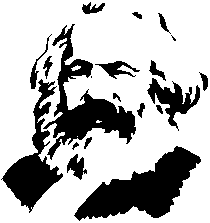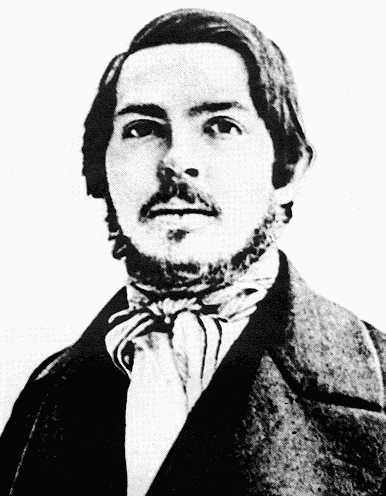


| Who |
Marx was the son a converted Protestant Jewish lawyer and wrote radical journals, which exiled him from Germany and France and led him to England; Engels was the son of a wealthy industrialist and went to England to run his father's cotton mill in Manchester, England. |
| What |
Friedrich Engels (above) wrote the
actual
words of the Manifesto, but they are based on Marx's
ideas. |
| Where |
Both born in present-day Germany
(Trier
and Barmen) and ended their lives in London, England. |
| When |
1818-83 (Marx) and 1820-95 (Engels); Manifesto
written (at the instructions of the International Communist League) in
1848,
rpt. German 1872, Russian trans. in 1882, Enl. trans. in 1888 |
| Why |
The 1848
revolutions
across Europe and the extremely horrible working conditions of the
19th century
form the historical context for the Manifesto, which was
written just
as socialist thought and workers' unions were uniting in protest. The rebellions in 1848 were failed revolutions in the sense that they did not elicit lasting political change. As with most historical movements, the effects of this publication were long ranging. The Communist Manifesto has had a profound effect on world history. |
| Oppositions (Class Struggles): · freeman/slave · patrician/plebeian · lord/serf · oppressor/oppressed · bourgeoisie/proletariat What are more modern terms for these binaries? |
"Meantime, the markets kept ever growing, the demand ever rising. Even manufacturers no longer sufficed. Thereupon, steam and machinery revolutionized industrial production. The place of manufacture was taken by the giant, Modern Industry; the place of the industrial middle class by industrial millionaires, the leaders of the whole industrial armies, the modern bourgeois.
Modern industry has established the world market, for
which
the discovery of America paved the way. This market has given an
immense
development to commerce, to navigation, to communication by land. This
development
has, in turn, reacted on the extension of industry; and in proportion
as
industry, commerce, navigation, railways extended, in the same
proportion
the bourgeoisie developed, increased its capital, and pushed into the
background
every class handed down from the Middle Ages."
"The bourgeoisie, wherever it has got the upper hand, has
put
an end to all feudal, patriarchal, idyllic relations. It has
pitilessly
torn asunder the motley feudal ties that bound man to his 'natural
superiors,'
and has left no other nexus between man and man than naked
self-interest,
than callous 'cash payment.' It has drowned out the most heavenly
ecstasies
of religious fervour, of chivalrous enthusiasm, of philistine
sentimentalism,
in the icy water of egotistical calculation. It has resolved personal
worth
into exchange value, and in place of the numberless indefeasible
chartered
freedoms, has set up that single, unconscionable freedom — Free Trade.
In
one word, for exploitation, veiled by religious and political
illusions, it
has substituted naked, shameless, direct, brutal exploitation"
(20,
my emphasis).
"The bourgeoisie, by the rapid improvement of all
instruments
of production, by the immensely facilitated means of communication,
draws
all, even the most barbarian, nations into civilization. The cheap
prices
of commodities are the heavy artillery with which it forces the
barbarians'
intensely obstinate hatred of foreigners to capitulate. It compels all
nations,
on pain of extinction, to adopt the bourgeois mode of production;
it compels them to introduce what it calls civilization into their
midst,
i.e., to become bourgeois themselves. In one word, it creates a world
after
its own image" (22, my emphasis).
"Owing to the extensive use of machinery, and to the
division
of labor, the work of the proletarians has lost all individual
character,
and, consequently, all charm for the workman. He becomes an
appendage
of the machine, and it is only the most simple, most monotonous,
and
most easily acquired knack, that is required of him. Hence, the cost of
production
of a workman is restricted, almost entirely, to the means of
subsistence that
he requires for maintenance, and for the propagation of his race. But
the
price of a commodity, and therefore also of labor, is equal to its cost
of
production. In proportion, therefore, as the repulsiveness of the work
increases,
the wage decreases. What is more, in proportion as the use of machinery
and
division of labor increases, in the same proportion the burden of toil
also
increases, whether by prolongation of the working hours, by the
increase
of the work exacted in a given time, or by increased speed of
machinery,
etc." (26).
"1. Abolition of property in land and
application
of all rents of land to public purposes.
2. A heavy progressive or graduated income tax.
3. Abolition of all rights of inheritance.
4. Confiscation of the property of all emigrants and rebels.
5. Centralization of credit in the banks of the state, by means of a
national
bank with state capital and an exclusive monopoly.
6. Centralization of the means of communication and transport in the
hands
of the state.
7. Extension of factories and instruments of production owned by the
state;
the bringing into cultivation of waste lands, and the improvement of
the soil
generally in accordance with a common plan.
8. Equal obligation of all to work. Establishment of industrial armies,
especially
for agriculture.
9. Combination of agriculture with manufacturing industries; gradual
abolition
of all the distinction between town and country by a more equable
distribution
of the populace over the country.
10. Free education for all children in public schools. Abolition of
children's
factory labor in its present form. Combination of education with
industrial
production, etc." (42-3).
"Bourgeois marriage is, in reality, a system of wives in
common
and thus, at the most, what the Communists might possibly be reproached
with
is that they desire to introduce, in substitution for a hypocritically
concealed,
an openly legalized system of free love. For the rest, it is
self-evident
that the abolition of the present system of production must bring with
it
the abolition of free love springing from that system, i.e., of
prostitution
both public and private" (39).